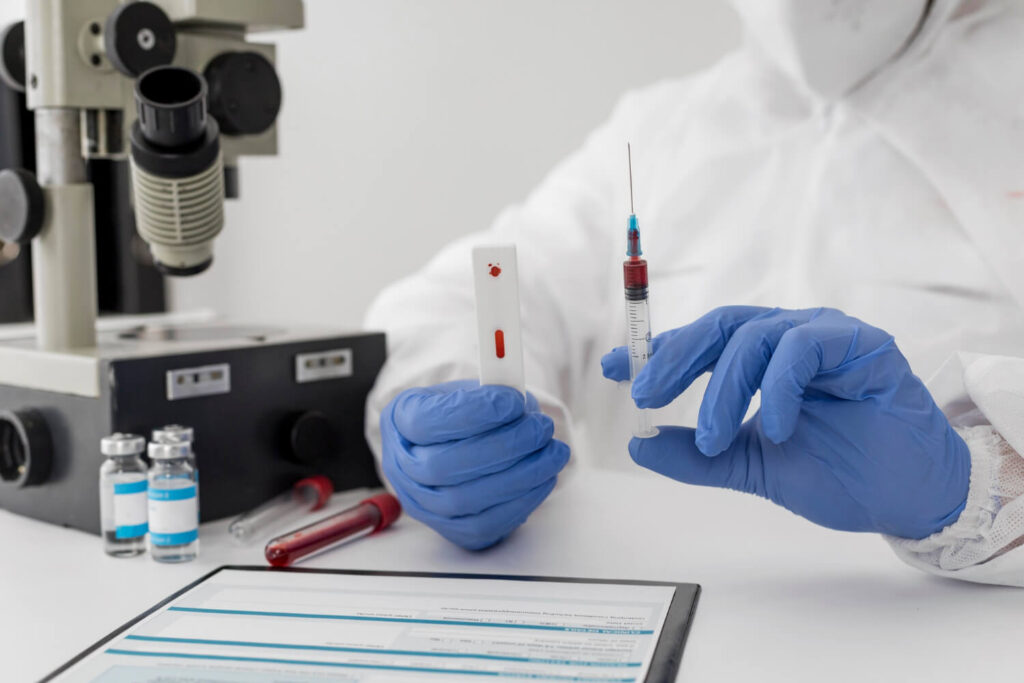When it comes to health concerns, hepatitis b virus is one of the risks that experts monitor. If a person had hepatitis b, it can progress to chronic liver disease such as liver failure, which might put their life at risk. That’s why early detection is a must, which in the form of hepatitis b test can happen. Let’s explore what hepatitis b reactive means and its implications for individuals who test positive for the infection. Let’s begin!
What is Hepatitis B?
Hepatitis B is a viral infection that primarily affects the liver. It is caused by the hepatitis B virus (HBV) and can result in inflammation of the liver, known as viral hepatitis. The hepatitis B virus is transmitted through contact with infected blood or body fluids like semen, saliva etc. It can be spread through sexual contact, sharing needles or syringes, and from mother to child during childbirth.
Once the hepatitis B virus enters the body, it targets liver cells and begins to replicate. This replication can lead to inflammation of the liver, resulting in hbv infection. The virus has an incubation period of 30 to 180 days, during which an infected individual may not experience any symptoms. This makes it difficult to detect the infection early on, but through a test, it might be possible.

The hepatitis B virus can be detected through blood tests that look for specific markers of the infection. One such marker is the hepatitis B surface antigen (HBsAg). This antigen is a protein that is present on the surface of the virus and is one of the earliest signs of a hepatitis B infection. Testing for HBsAg can help determine if a person has been infected with the hepatitis B virus.
Take note that hepatitis b is one of the leading causes of death. Its health risk is highly alarming, especially when its serious symptoms are not detected early. It’s best to have access to tools like antigen tests to further monitor your condition and to know what next step to pursue.
Understanding Hepatitis B Tests
Testing is an essential tool in the management and prevention of hepatitis B. It helps identify individuals who are infected with the virus, determine the stage of infection, and monitor the effectiveness of treatment. Hepatitis B tests can detect the presence of specific markers of the virus, such as antigens and antibodies. These markers can help healthcare providers make informed decisions regarding treatment and follow-up care.

Types of Hepatitis B Tests
There are several types of tests that can be used to diagnose and monitor hepatitis B infection. These tests include:
- Hepatitis B surface antigen (HBsAg) test: Detects the presence of the hepatitis B surface antigen, which is an early sign of infection.
- Hepatitis B surface antibody (anti-HBs) test: Measures the level of antibodies produced in response to the hepatitis B virus.
- Hepatitis B core antibody (anti-HBc) test: Detects antibodies to the core protein of the hepatitis B virus.
- Hepatitis B e antigen (HBeAg) test: Can confirm the presence of the HBeAg, which is a marker of active viral replication.
These tests, along with others, help healthcare providers determine the stage of infection, monitor the effectiveness of treatment, and assess the risk of transmitting the virus to others.
What Does Hepatitis B Reactive Means
Being hepatitis B reactive means that a person has tested positive for the presence of hepatitis B virus markers in their blood. This indicates that the person is infected with the virus and may be capable of transmitting it to others. While a positive test result can be concerning, it is important to remember that hepatitis B is a manageable condition with proper medical care and adherence to preventive measures.

Take note that hepatitis B reactive means that appropriate medical care and preventive measures should be taken to manage the infection and reduce the risk of complications. Although it doesn’t mean that a person will experience severe symptoms or long-term liver damage. Still it is important to take action if your test confirms reactive status,
Implications of Being Hepatitis B Reactive
Now that you know what hepatitis b reactive means, it is also vital to understand the implications it can bring to one’s health. Being hepatitis B reactive has important implications for an individual’s health and well-being. While some people may clear the infection on their own, others may develop a chronic infection that can have long-term effects on the liver.
Chronic hepatitis B can lead to liver cell damage, scarring, and cirrhosis. Furthermore, it can even progress to liver cancer since it is a leading cause of liver cancer. It is important for individuals who test positive for hepatitis B to work closely with their healthcare provider to manage the infection and prevent these complications.
Benefits and Challenges of Early Detection
Early detection of hepatitis B is crucial for effective management and prevention of complications. Detecting and diagnosing the infection in its early stages allows for timely intervention and appropriate medical care.
Here are some of the benefits that patients can have due to early detection:
- Early intervention and treatment: Early detection allows healthcare providers to initiate appropriate treatment measures to manage the infection and reduce the risk of complications.
- Preventing liver damage: Timely management of hepatitis B can help prevent liver cell damage, scarring, and cirrhosis.
- Preventing transmission: Early detection and follow-up care can help individuals reduce the risk of transmitting the virus to others.
- Improved quality of life: Early intervention and effective management of hepatitis B can help individuals lead a healthier and more fulfilling life.
Despite the importance of early detection, there are several challenges in diagnosing hepatitis B in its early stages. These challenges include:
- Lack of symptoms: Hepatitis B infection can be asymptomatic in its early stages, making it difficult to detect.
- Variability in testing methods: Different tests and laboratory techniques may yield varying results, leading to challenges in interpreting and confirming the diagnosis.
- Sampling limitations: Hepatitis B can affect different tissues, including the liver and blood. Obtaining an accurate sample for testing can sometimes be challenging.
It is important for patients to be aware of their health to prevent higher risk complications from happening. In the case of hepatitis b, there are several complications that may occur, which is why early detection is important. For a more accurate diagnosis, patients can visit health experts who can discuss the perks of using tests to detect HBV.
Prevention and Vaccination

Preventative Measures Against Hepatitis B
Since chronic hepatitis b infection can occur from various reasons, including some poor choices in one’s action, its prevention is possible to happen. Preventing hepatitis B infection involves taking certain precautions and adopting healthy lifestyle practices.
Here are some preventative measures you can take:
- Get vaccinated: Ensure that you and your family members receive the full course of the hepatitis B vaccine. Vaccination is the most effective way to prevent infection.
- Practice safe sex: Use barrier methods, such as condoms, during sexual intercourse to reduce the risk of transmission.
- Avoid sharing needles: If you use intravenous drugs, always use clean, sterile needles and avoid sharing them with others.
- Practice good hygiene: Wash your hands thoroughly with soap and water after using the bathroom, changing diapers, or coming into contact with bodily fluids.
- Avoid sharing personal items: Do not share items such as toothbrushes, razors, or needles, as they can spread the infection.
By following these preventative measures, you can significantly reduce your risk of hepatitis B infection.
Understanding Hepatitis B Vaccination
Preventing hepatitis B is crucial in controlling the spread of the virus. Another effective way to prevent hepatitis B is through vaccination. The hepatitis B vaccine is highly effective, and recommended for all individuals at high risk of infection. Vaccination not only prevents the individual from getting infected but also helps in reducing the overall prevalence of hepatitis B in the population.
The vaccine is typically given as a series of three or four shots over a period of six months. It stimulates the immune system to produce antibodies that protect against the virus.
Here’s what you need to know about hepatitis B vaccination:
- Schedule: The hepatitis B vaccine is typically given as a series of three or four shots over a period of six months. The exact schedule may vary depending on the vaccine brand and your age.
- Target population: The vaccine is recommended for all individuals, especially infants, children, and adolescents. It is also recommended for adults who are at high risk of infection, such as healthcare workers, people with multiple sexual partners, and individuals who use intravenous drugs.
- Safety: The hepatitis B vaccine is considered safe and well-tolerated. Common side effects include pain or redness at the injection site, mild fever, and fatigue. Severe allergic reactions are rare.
- Effectiveness: The vaccine is highly effective in preventing hepatitis B infection. Studies have shown that it can provide long-lasting immunity for at least 20 years.
It is important to complete the full course of the vaccine to ensure maximum protection against hepatitis B.
Frequently Asked Questions
Is hepatitis b reactive the same as being infectious?
No, hepatitis B reactive means that you have tested positive for hepatitis B surface antigens in your blood, indicating a current or past infection. It does not necessarily mean that you are actively infectious. The infectiousness of hepatitis B can vary depending on factors such as viral load, variants of the virus, and the presence of other infections like HIV or multiple sclerosis (MS).
Can you clear a hepatitis b reactive status?
In most cases, individuals who test positive for hepatitis B surface antigens (HBsAg) will clear the infection within six months. However, for some individuals, the virus may persist in their blood, leading to a chronic infection. Clearing a hepatitis B reactive status depends on various factors, including the individual’s immune response, viral load, and the presence of any co-existing conditions like colorectal cancer. Consult a healthcare professional for guidance and monitoring.
How often should someone with hepatitis b be tested?
People with chronic hepatitis B should be regularly monitored to assess the progression of the infection. The frequency of testing may vary depending on factors such as the individual’s viral load, liver function, and the presence of any co-existing conditions. It is recommended to consult a healthcare professional for guidance.
Conclusion
Finding out what hepatitis b reactive means is just the beginning of the intervention steps against the HBV. As mentioned, reactive only means the presence of the virus is there, but also means the need to begin the health intervention. In that case, it is important to undergo a consultation to fully address and cure hepatitis b.
If you think you might have the hepatitis b virus, you might want to visit a doctor. Book an online consultation with a hepatologist to undergo an HBV test. At the same time, if you have a reactive result, it is best to seek the best treatment promptly.
Stay proactive and seek professional guidance for optimal care.
Hepatitis B Awareness Quiz
Test your knowledge from “Understanding What Hepatitis B Reactive Means”



